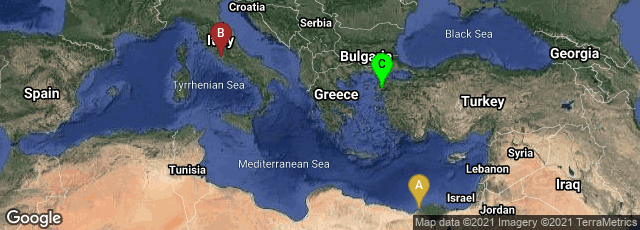
A: Alexandria Governorate, Egypt, B: Roma, Lazio, Italy, C: Çanakkale, Turkey
An Imperial Roman (1st or 2nd century AD) copy of a lost bronze sculpture made by Lysippos, preserved in the Louvre.
The library of Aristotle is the first private library concerning which there is considerable discussion among early commentators. Writing more than 300 years after Aristotle's death, in the first decades of the first century CE, the geographer Strabo provided one of the most detailed early accounts in his Geographia XIII, 1, 54-55, stating, among other things that Aristotle was "the first man, so far as I know, to have collected books and to have taught the kings in Egypt how to arrange a library." Strabo's account in English translation is below. The Egyptian kings were referred to were probably the Ptolemies in Alexandria. The translation is by H. L. Jones (London, 1929); the links are, of course, mine:
"From Scepsis came the Socratic philosophers Rastus and Coriscus and Neleus the son of Coriscus, this last a man who not only was a pupil of Aristotle and Theophrastus, but also inherited the library of Theophrastus, which included that of Aristotle. At any rate, Aristotle bequeathed his own library to Theophrastus, to whom he also left his school; and he is the first man, so far as I know, to have collected books and to have taught the kings in Egypt how to arrange a library. Theophrastus bequeathed it to Neleus; and Neleus took it to Scepsis [at the present site of the village of Kurşuntepe, near the town of Bayramiç in Turkey] and bequeathed it to his heirs, ordinary people, who kept the books locked up and not even carefully stored. But when they heard how zealously the Attalid kings to whom the city was subject were searching for books to build up the library in Pergamum, they hid the books underground in a kind of trench. But much later, when the books had been damaged by moisture and moths, their descendants sold them to Apellicon of Teos for a large sum of money, both the books of Aristotle and those of Theophrastus. But Apellicon was a bibliophile rather than a philosopher; and therefore, seeking a restoration of the parts that had been eaten through, he made new copies of the text, filling up the gaps incorectly, and published the books full of errors. The result was that the earlier school of Peripatetics who came after Theophrastus had no books at all, with the exception of only a few, mostly exoteric works, and were therefore able to philosophise about nothing in a practical way, but only to talk bombast about commonplace propositions, whereas the later school, from the time the books in question appeared, though better able to philosophise and Aristotelise, were forced to call most of their statements probabilities, because of the large number of errors. Rome also contributed much to it; for immediately after the death of Apellicon, Sulla, who had captured Athens carried off Apelicon's library to Rome, where Tyrannion the grammarion, who was fond of Aristotle, got it in his hands by paying court to the librarian, as did also certain booksellers who used bad copyists and would not collate the texts— a thing that also takes place in the case of the other books that are copied for selling both here [Rome] and at Alexandria.".
"Another account relates that Ptolemy II (285-246 B.C.) acquired Aristotle’s library directly from Neleus and brought it to Egypt to become a part of the great Alexandrian library. It is possible that both stories are partially correct, and it is quite probable that copies at least of Aristotle’s library reached Alexandria eventually” (Harris, History of Libraries in the Western World 4th ed. [1999] 41).
Blum, Kallimachos: The Alexandrian Library and the Origins of Bibliography, tr. by H. Wellisch (1991) 2.6."The Library of Aristotle," 53-64.
(This entry was last revised on 08-05-2014).